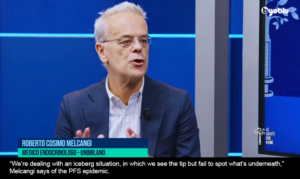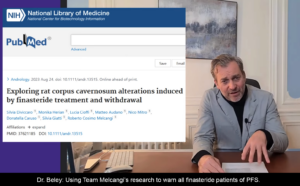‘My colleagues are seeing many cases’ of this condition, the UniMi endocrinology professor notes in his first-ever long-form TV interview
Jan. 7, 2024
Dear Friends:
After a decade of being reduced to mere soundbites on TV news reports, Roberto Cosimo Melcangi is finally getting some quality time in the spotlight.
Last month, Italy’s Byoblu TV—having been inundated with viewer complaints about adverse reactions to finasteride—invited the Head of the Neuroendocrinology Unit in the Department of Pharmacological and Biomolecular Sciences at the University of Milano (UniMi) to sit down for an uninterrupted, 25-minute interview about his chief area of expertise: post-finasteride syndrome.
 Conducted by Byoblu news anchor Davide G. Porro, the discussion appeared on La Salute Che Viene (Health Horizon) (English-subtitled version here), which boasts 500,000 viewers.
Conducted by Byoblu news anchor Davide G. Porro, the discussion appeared on La Salute Che Viene (Health Horizon) (English-subtitled version here), which boasts 500,000 viewers.
“As someone who deals with pharmacology, I can say that, so many times, plenty of young men—due to our current struggle with the chaotic Internet market—take these drugs without a prescription,” says Melcangi of the online proliferation of finasteride-based hair-loss remedies.
“This is a serious risk. We specifically ask people who prescribe these drugs, and I’m referring to dermatologists, to try to provide information about their pros and cons. My endocrinologist and andrologist colleagues are already quite sensitive, because they’re seeing many cases of PFS.”
Melcangi, who has published 10 original studies and 3 meta-analyses on the condition since 2013—arguably making him the world’s leading expert—also posits that PFS may be unique in the annals of pharmacology.
“This is a really tricky condition to assess, due to so few logical explanations,” he says. “It’s a mysterious pathology, because at some point [in our early research] we went, How is it possible that even after stopping the drug these side effects persist?
“This goes completely against classical pharmacology, which does not work like that. It tells us that if I stop taking a drug, its side effects will also stop.
“We’re aware of people who, even 10 to 20 years after quitting, continue to suffer from these side effects, which are mainly sexual, but also affect other areas. For example, depression, anxiety and psychological instability.”
Worse still, adds Melcangi, “Many young patients suffering from these symptoms have committed suicide.”
 As such, he hopes that his ongoing investigations into PFS will inspire fellow researchers to follow suit:
As such, he hopes that his ongoing investigations into PFS will inspire fellow researchers to follow suit:
“We’re very confident in what we do, but it’s very important that other scientific professionals confirm our findings. Because that’s how science works.”
Until then, we imagine Melcangi was encouraged to learn that the findings of his team’s latest study are being touted on the chaotic Internet by a prominent French doctor.
Two weeks ago, Sebastian Beley, MD, a urological surgeon at the American Hospital of Paris, and professor of andrology at the University of Paris, dedicated an entire edition of his eponymous YouTube show (Post-Finasteride Syndrome: The Price to Pay for Keeping Your Hair?) to reviewing Exploring rat corpus cavernosum alterations induced by finasteride treatment and withdrawal, which was published this summer in Andrology.
“With regard to PFS, a team of researchers wanted to know if taking finasteride could induce changes in the corpus cavernosum [i.e., erectile tissue in the penis]. So they used a rat model,” said Dr. Beley.
“The rats were exposed to finasteride for more than 20 days. Then the researchers examined the corpus cavernosum to determine if any structural or molecular changes had taken place. The team was able to show a series of modifications in the [biological functionality] that’s essential in obtaining and maintaining an erection.
 “The conclusion is that one must be very careful with this medication, as it’s sometimes prescribed quickly, without always informing the person receiving it of its risks, or of what to do if he experiences sexual or other adverse reactions.”
“The conclusion is that one must be very careful with this medication, as it’s sometimes prescribed quickly, without always informing the person receiving it of its risks, or of what to do if he experiences sexual or other adverse reactions.”
Anyone living in the US who suffers from PFS should report his or her symptoms to the US FDA. Anyone living outside the US who suffers from PFS should report his or her symptoms to the US FDA as well as to his or her local drug-regulatory authority (DRA), as directed on our Report Your Side Effects page.
Finally, if you or a loved one are suffering from PFS, and feeling depressed or unstable, please don’t hesitate to contact the PFS Foundation as soon as possible via our Patient Support hotline: social@pfsfoundation.org.
Thank you.
